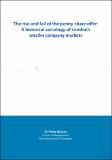Files in this item
The rise and fall of the penny-share offer : A historical sociology of London’s smaller company markets
Item metadata
| dc.contributor.author | Roscoe, Philip John | |
| dc.date.accessioned | 2017-09-18T16:30:07Z | |
| dc.date.available | 2017-09-18T16:30:07Z | |
| dc.date.issued | 2017-10 | |
| dc.identifier | 251080627 | |
| dc.identifier | 5e692cef-5a74-4838-9014-811acfb79652 | |
| dc.identifier.citation | Roscoe , P J 2017 , The rise and fall of the penny-share offer : A historical sociology of London’s smaller company markets . University of St Andrews . | en |
| dc.identifier.other | ORCID: /0000-0002-5974-945X/work/57568167 | |
| dc.identifier.uri | https://hdl.handle.net/10023/11688 | |
| dc.description | This work has been supported by a Leverhulme Trust Research Fellowship (RF-2016-078) | en |
| dc.description.abstract | This report offers a narrative, ‘historical sociology’ of two markets established in London in 1995 in response to a series of rule changes at the London Stock Exchange (LSE). The first, the Alternative Investment Market, or AIM, was set up by the LSE. It was established as part of LSE chief executive Michael Lawrence’s ‘seven-point plan’ for the repositioning of the Exchange as an engine for economic growth focused on the UK regions. AIM was also, in part, a reactive move allowing the Exchange to deal with competitive threats in Europe and at home, particularly growing activity under its own Rule 535. It has acted as a proving ground for many smaller companies and plays an important role in the political positioning of the LSE. The second, OFEX (renamed PLUS in 2004) was privately operated and driven by commercial demand. Originally operated as a trading facility, it achieved legal recognition as a ‘designated market’ in 2001, and then as a Recognized Investment Exchange (RIE) in 2007. As OFEX it coexisted with the LSE and rode the dotcom wave; as PLUS it served as a vehicle for a market rebellion against the LSE. It struggled to maintain a commitment to its original small company constituency and to compete as a trading venue of choice against the Exchange. While AIM has flourished, PLUS faltered after the financial crisis of 2008, and my narrative finishes in 2012 with the sale of the PLUS RIE licence to ICAP, now NEX. | |
| dc.format.extent | 120 | |
| dc.format.extent | 2118342 | |
| dc.language.iso | eng | |
| dc.publisher | University of St Andrews | |
| dc.subject | HG Finance | en |
| dc.subject | HM Sociology | en |
| dc.subject | SDG 8 - Decent Work and Economic Growth | en |
| dc.subject.lcc | HG | en |
| dc.subject.lcc | HM | en |
| dc.title | The rise and fall of the penny-share offer : A historical sociology of London’s smaller company markets | en |
| dc.type | Report | en |
| dc.contributor.sponsor | The Leverhulme Trust | en |
| dc.contributor.institution | University of St Andrews. School of Management | en |
| dc.identifier.grantnumber | RF-2016-078 | en |
This item appears in the following Collection(s)
Items in the St Andrews Research Repository are protected by copyright, with all rights reserved, unless otherwise indicated.

